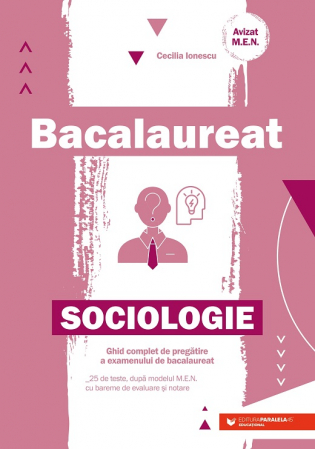6359.png) From theory to practice. A vision on public and social policies in Romania - Mihaela Luminita Sandu, Mihaela Rus, Tanase Tasente
From theory to practice. A vision on public and social policies in Romania - Mihaela Luminita Sandu, Mihaela Rus, Tanase Tasente
Publisher: Editura Universitara
Author: Tanase Tasente, Mihaela Luminita Sandu, Mihaela Rus
Edition: I
Pages: 264
Publisher year: 2023
ISBN: 978-606-28-1704-6
DOI: 10.5682/9786062817046
- Description
- Download (1)
- Authors
- Content
- More details
- Reviews (0)
The presentation in the clearest possible form of the issue of the development and application of public and social policies focuses on the main mechanisms that intervene in these processes.
The book is structured in eleven chapters, carrying out a broad analysis of the public and social policies applied in the Romanian society in permanent transformation, in which social problems change rapidly, and the public policies regarding social services, social assistance and inclusion must adapt to new requirements and meet the needs of people in difficulty. Thus, the state fulfills the regulatory function and establishes, through the policies it adopts, the framework for the production and provision of social services, and the civil society organizations have tools at their fingertips through which they can increase the quality of social services.
Of particular scientific interest is the information related to social indicators, which serve for quantitative and qualitative knowledge of socio-economic phenomena and processes. The increased interdependence of social activity, the interrelationships between economic activity and the other domains of social life presuppose important changes in the way to measure and evaluate economic and social dynamics. Social indicators are quantitative benchmarks that measure an element of social reality and allow the statistical interpretation of the notion of "quality of life".
The authors deepen the aspects related to the quality of life, by presenting the indicators, methods and the role of the welfare state, which is based on the principles of equal opportunities, on the fair distribution of resources and on public responsibility towards those who cannot secure the minimum resources to lead a better life.
The problem addressed in this book had as its starting point the concerns existing at the national level regarding the social policies of support for women and children, the public policies in the field of health, the social policies of employment and combating unemployment, social policies regarding the eradication of poverty.
Another important aspect of the book consists in the identification of support policies for women and children that experienced the biggest discrepancies between the formally promoted rights and their real coverage. From a legislative point of view, women's participation in non-discriminatory conditions at work and in social life is generally covered. Analyzing public policies in the field of health, the idea emerges that at the level of society, high health is the key element of human capital. Health policies contribute to changing the state of health, both at the individual level and at the societal level. A good state of health represents an important resource that intervenes within all sectors and the entire civil society, its benefit being priceless.
The impact of the social protection policy on the family and the child is highlighted, the social policy in the family sphere constituting itself as a subsystem of the social policies, in general, bringing together a set of measures or programs, an appropriate legislative framework and which has as its object the way in which these measures structure the living conditions of families.
In the field of employment and combating unemployment, the issue is generally addressed through two types of social policies: passive policies, constituting the financial support of the unemployed and which assume the payment in cash over a certain period of allowances and active policies, whose objective is to support the unemployed in finding a job.
An in-depth analysis of poverty, extreme poverty and types of poverty leads to an approach to combating poverty and social exclusion that must be based on the concept of providing integrated services and ensuring that the various programs and interventions are harmonized and aligned.
-
From theory to practice. A vision on public and social policies in Romania
Download

MIHAELA LUMINITA SANDU
Lecturer at the Ovidius University of Constanta, Faculty of Psychology and Educational Sciences and principal psychologist in the specialty of work and organizational psychology. Doctor in Sociology from the University of Bucharest. Author of numerous studies and articles published in the country and abroad, as well as some specialized books.

MIHAELA RUS
PhD in psychology from Babes-Bolyai University in Cluj, full professor at Ovidius University in Constanta, having a scientific activity supported and materialized through constant participation, through scientific communications, at local and international scientific events. He is a PhD coordinator at the Constantin Radulescu-Motru Institute of Philosophy and Psychology of the Romanian Academy. It should be noted the number and scientific consistency of the various studies, articles in the field of organizational psychology, in specialized magazines, in collective volumes, courses or monographs. We find among his main areas of interest: work and organizational psychology, social psychology, organizational communication, social statistics, judicial psychology. Since 2017, he is the president of the Romanian College of Psychologists, Constanta branch.

TANASE TASENTE
Currently, he is a lecturer and ERASMUS coordinator at the Faculty of Law and Administrative Sciences of the Ovidius University of Constanta. He completed bachelor's, master's and doctorate studies in Communication Sciences, also having a master's degree in European Administration. His academic activity includes the publication of over 100 scientific articles and the writing of 4 books on social media communication and public policies.
Introduction / 13
I. Public policies / 15
I.1. Historical perspective on public policies / 15
I.2. Historical perspective on social policies / 20
I.3. The evolution and development of public and social policies in post-December Romania / 24
I.4. The role and influence of public policies on contemporary life / 29
II. Public policies. Theoretical approach / 32
II.1. Definition of the concept of "public policy" / 32
II.2. Public policies and related concepts / 40
II.3. Construction and typology of public policies / 44
II.4. Types of public policies / 49
II.4.1. Economic and social policies / 49
II.4.2. Substantive policies and procedural policies / 54
II.4.3. Social policies / 56
II.5. The effects of public policies / 58
III. Social politics. Theoretical approaches / 61
III.1. Defining social policies / 61
III.2. Social policies and related concepts / 68
III.3. The effects of social policies / 69
III.4. Aspects of social policy in Romania. / 74
General characterization / 74
IV. Social indicators / 79
IV.1. Definition of social indicators / 79
IV.2. Social indicators. / 85
IV.2.1. Classification of social indicators / 85
IV.2.2. The functions of social indicators / 94
IV.3. The system of social indicators / 97
IV.4. Social indicators by domain. / 99
Meanings, Relevance, Correlations / 99
IV.4.1. Population / 100
IV.4.2. Education / 106
V. Analysis of public policies / 110
V.1. Theoretical approaches / 110
V.2. The cycle of public policies / 117
V.3. Formulation of public policies / 123
V.4. Implementation of public policies / 127
V.5. Evaluation of public policies / 133
V.6. Review of public policies / 139
VI. Quality of life and social welfare / 143
VI.1. Defining the quality of life / 143
VI.2. Quality of life indicators. / 147
Ways of increasing the quality of life / 147
VI.3. Human development and quality of life / 158
VI.4. Social welfare and the role of the state in the production of welfare / 163
VIII. Configuring the support policy for women / 168
VII.1. Introduction, Context of support policies for women, Policy objectives / 168
VII.2. Policies in the field of women's rights after 1989 and women's participation in the labor market / 172
VII.3. Support policies for women with children / 180
VIII. Health as a public good. / 183
VIII.1. The medical protection system - developments. / 183
VIII.2. Medical protection system / 189
VIII.2.1. Generalities of the evolution of the medical system / 189
VIII.2.2. The history of health as a public good and the evolution of the medical system in Romania / 190
VIII.2.3. The health care system in Romania / 196
VIII.2.4. Equity vs. inequality in the use and access to health services / 198
IX. Social protection of the family and children in Romania. / 201
IX.1. The concept of family / 201
IX.2. The evolution of the family in Romania / 205
IX.3. The influence of the family climate on the child's development / 210
IX.4. The impact of the social protection policy on the family and the child / 217
X. Social policies for employment and combating unemployment. / 220
X.1. Social protection strategies for unemployed people: Passive and active approaches / 227
X.1.1. Unemployment compensation / 228
X.1.2. Measures to reduce unemployment and improve its impact / 230
XI. Social policies to combat poverty / 235
XI.1. Poverty and extreme poverty in Romania / 235
XI.2. Types of poverty and types of poor areas / 243
Bibliography / 250
The present book opens with a synthetic presentation of the institutional and financial arrangements of social protection. The analysis carried out captures the evolution and development of public and social policies in Romania, as well as their impact on contemporary life.
The presentation in the clearest possible form of the issue of the development and application of public and social policies focuses on the main mechanisms that intervene in these processes.
The book is structured in eleven chapters, carrying out a broad analysis of the public and social policies applied in the Romanian society in permanent transformation, in which social problems change rapidly, and the public policies regarding social services, social assistance and inclusion must adapt to new requirements and meet the needs of people in difficulty. Thus, the state fulfills the regulatory function and establishes, through the policies it adopts, the framework for the production and provision of social services, and the civil society organizations have tools at their fingertips through which they can increase the quality of social services.
Of particular scientific interest is the information related to social indicators, which serve for quantitative and qualitative knowledge of socio-economic phenomena and processes. The increased interdependence of social activity, the interrelationships between economic activity and the other domains of social life presuppose important changes in the way to measure and evaluate economic and social dynamics. Social indicators are quantitative benchmarks that measure an element of social reality and allow the statistical interpretation of the notion of "quality of life".
The authors deepen the aspects related to the quality of life, by presenting the indicators, methods and the role of the welfare state, which is based on the principles of equal opportunities, on the fair distribution of resources and on public responsibility towards those who cannot secure the minimum resources to lead a better life.
The problem addressed in this book had as its starting point the concerns existing at the national level regarding the social policies of support for women and children, the public policies in the field of health, the social policies of employment and combating unemployment, social policies regarding the eradication of poverty.
Another important aspect of the book consists in the identification of support policies for women and children that experienced the biggest discrepancies between the formally promoted rights and their real coverage. From a legislative point of view, women's participation in non-discriminatory conditions at work and in social life is generally covered. Analyzing public policies in the field of health, the idea emerges that at the level of society, high health is the key element of human capital. Health policies contribute to changing the state of health, both at the individual level and at the societal level. A good state of health represents an important resource that intervenes within all sectors and the entire civil society, its benefit being priceless.
The impact of the social protection policy on the family and the child is highlighted, the social policy in the family sphere constituting itself as a subsystem of the social policies, in general, bringing together a set of measures or programs, an appropriate legislative framework and which has as its object the way in which these measures structure the living conditions of families.
In the field of employment and combating unemployment, the issue is generally addressed through two types of social policies: passive policies, constituting the financial support of the unemployed and which assume the payment in cash over a certain period of allowances and active policies, whose objective is to support the unemployed in finding a job.
An in-depth analysis of poverty, extreme poverty and types of poverty leads to an approach to combating poverty and social exclusion that must be based on the concept of providing integrated services and ensuring that the various programs and interventions are harmonized and aligned.
The editorial appearance of the book is of particular importance, because it presents the way of integrating sectoral social policies, as a direct response to the complexity of social and human problems, with the aim of ensuring the conditions necessary to increase the quality of life through individual and collective well-being.
Univ. Assoc. Dr. Maria Pescaru
National Polytechnic University of Science and Technology, Bucharest
Customer Support Monday - Friday, between 8.00 - 16.00
0745 200 718 0745 200 357 comenzi@editurauniversitara.ro
![From theory to practice. A vision on public and social policies in Romania - Mihaela Luminita Sandu, Mihaela Rus, Tanase Tasente [1] From theory to practice. A vision on public and social policies in Romania - Mihaela Luminita Sandu, Mihaela Rus, Tanase Tasente [1]](https://gomagcdn.ro/domains/editurauniversitara.ro/files/product/large/de-la-teorie-la-practica-o-viziune-asupra-politicilor-publice-si-sociale-in-romania-904063.jpg)














